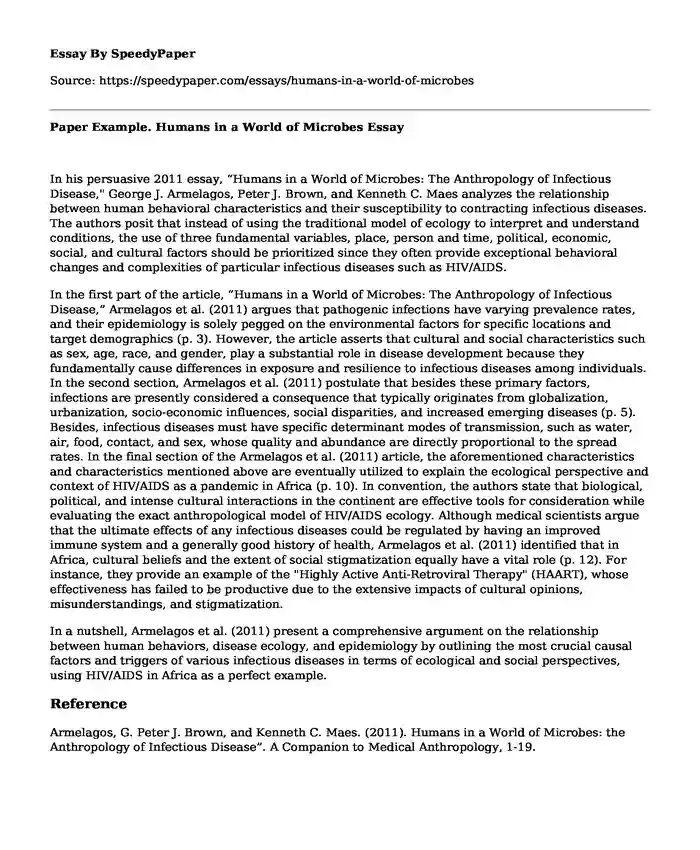
| Type of paper: | Essay |
| Categories: | Health and Social Care World HIV Social issue |
| Pages: | 2 |
| Wordcount: | 465 words |
In his persuasive 2011 essay, “Humans in a World of Microbes: The Anthropology of Infectious Disease," George J. Armelagos, Peter J. Brown, and Kenneth C. Maes analyzes the relationship between human behavioral characteristics and their susceptibility to contracting infectious diseases. The authors posit that instead of using the traditional model of ecology to interpret and understand conditions, the use of three fundamental variables, place, person and time, political, economic, social, and cultural factors should be prioritized since they often provide exceptional behavioral changes and complexities of particular infectious diseases such as HIV/AIDS.
In the first part of the article, “Humans in a World of Microbes: The Anthropology of Infectious Disease,” Armelagos et al. (2011) argues that pathogenic infections have varying prevalence rates, and their epidemiology is solely pegged on the environmental factors for specific locations and target demographics (p. 3). However, the article asserts that cultural and social characteristics such as sex, age, race, and gender, play a substantial role in disease development because they fundamentally cause differences in exposure and resilience to infectious diseases among individuals. In the second section, Armelagos et al. (2011) postulate that besides these primary factors, infections are presently considered a consequence that typically originates from globalization, urbanization, socio-economic influences, social disparities, and increased emerging diseases (p. 5). Besides, infectious diseases must have specific determinant modes of transmission, such as water, air, food, contact, and sex, whose quality and abundance are directly proportional to the spread rates. In the final section of the Armelagos et al. (2011) article, the aforementioned characteristics and characteristics mentioned above are eventually utilized to explain the ecological perspective and context of HIV/AIDS as a pandemic in Africa (p. 10). In convention, the authors state that biological, political, and intense cultural interactions in the continent are effective tools for consideration while evaluating the exact anthropological model of HIV/AIDS ecology. Although medical scientists argue that the ultimate effects of any infectious diseases could be regulated by having an improved immune system and a generally good history of health, Armelagos et al. (2011) identified that in Africa, cultural beliefs and the extent of social stigmatization equally have a vital role (p. 12). For instance, they provide an example of the "Highly Active Anti-Retroviral Therapy" (HAART), whose effectiveness has failed to be productive due to the extensive impacts of cultural opinions, misunderstandings, and stigmatization.
In a nutshell, Armelagos et al. (2011) present a comprehensive argument on the relationship between human behaviors, disease ecology, and epidemiology by outlining the most crucial causal factors and triggers of various infectious diseases in terms of ecological and social perspectives, using HIV/AIDS in Africa as a perfect example.
Reference
Armelagos, G. Peter J. Brown, and Kenneth C. Maes. (2011). Humans in a World of Microbes: the Anthropology of Infectious Disease”. A Companion to Medical Anthropology, 1-19.
Cite this page
Paper Example. Humans in a World of Microbes. (2023, Dec 11). Retrieved from https://speedypaper.net/essays/humans-in-a-world-of-microbes
Request Removal
If you are the original author of this essay and no longer wish to have it published on the SpeedyPaper website, please click below to request its removal:
- Essay Sample on Teaching Plan and Presentation for Acquired Pneumonia
- Essay Example on Ethical Dilemmas in Life Support
- Essay Example on Marijuana, Cannabis Sativa
- Essay Sample: Global Autism Public Health Initiative
- Essay Sample on The Decline in Business Startup in Britain
- Paper Example. the American Setting of Citizenship Approach
- Project on Learning Needs - Essay Sample
Popular categories




